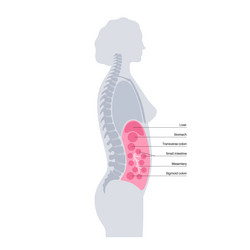AP5Stomach Kidneys Biology Diagrams abdominal cavity, largest hollow space of the body. Its upper boundary is the diaphragm, a sheet of muscle and connective tissue that separates it from the chest cavity; its lower boundary is the upper plane of the pelvic cavity. Vertically it is enclosed by the vertebral column and the abdominal and other muscles. The abdominal cavity contains the greater part of the digestive tract, the Learn about the abdominal cavity, a large space in the torso that contains digestive, reproductive, and excretion organs. See a diagram of the abdominal cavity and its regions, and test your knowledge with a quiz.

Abdominal Body Cavity: Labeled diagram of the abdominal cavity showing the small intestine (brown) covered by the visceral peritoneum (inner green layer), and the parietal peritoneum (outer red layer) lining the abdominal cavity. The peritoneal cavity is the potential space between the visceral and parietal peritoneum and contains peritoneal fluid.

Picture of Abdomen Biology Diagrams
Full labeled anatomical diagrams - Anatomy of the abdomen and digestive system: these general diagrams show the digestive system, with the major human anatomical structures labeled (mouth, tongue, oral cavity, teeth, buccal glands, throat, pharynx, oesophagus, stomach, small intestine, large intestine, liver, gallbladder and pancreas).

The abdominal cavity is the largest hollow space in the human body, containing many vital organs involved in digestion, excretion, and other essential functions. It is lined by a protective membrane called the peritoneum and houses organs such as the stomach, liver, pancreas, spleen, kidneys, intestines, and various blood vessels and nerves.

Body Cavities and Membranes: Labeled Diagram, Definitions Biology Diagrams
The abdominal cavity is the part of the body that houses the stomach, liver, pancreas, kidneys, gallbladder, spleen, and the large and small intestines. The diaphragm marks the top of the abdomen and the horizontal line at the level of the top of the pelvis marks the bottom. Connective tissue called the mesentery holds the abdominal organs
